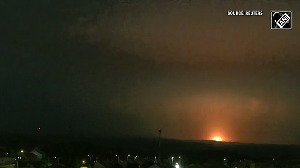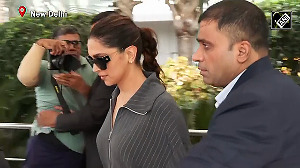Terrorists struck in Maharashtra on Friday, killing 38 people and injuring over 100 in three blasts including one in a mosque in the communally sensitive Muslim-dominated town of Malegaon.
The blasts occurred just before 2:00 pm at three different places -- nearly simultaneously -- leaving a trail of death and destruction.
Scores of people who had gathered in a mosque-cum-graveyard for Friday prayers were among the casualties.
Malegaon, which has a history of communal violence, was under curfew as the central and the state governments rushed paramilitary forces to deal with the situation officially described as tense but under control.
The explosions came less than two months after train blasts in Mumbai killed nearly 200 people on July 11.
They occurred only four days prior to the verdict in the 1993 Mumbai blasts case due on Tuesday.
Besides the mosque-cum-graveyard where people had come to pray for the dead on the occasion of Shab-e-Barat, the blasts also rocked the busy Mushaira Chowk and Ayesha Nagar locality.
Deputy Chief Minister R R Patil, who visited the blast sites, said 37 people were killed in the three explosions.
A near-stampede broke out immediately after the blasts as devotees, including children, rushed out of the narrow gate in panic with many of them trampling over the dead bodies and those seriously injured.
Local officials said that over 100 people injured in the blasts were rushed to the Wadia Hospital and other hospitals in the town while some of the seriously wounded were moved to Nashik, about 100km from Malegaon.
The devotees also helped the injured rush to nearby hospitals on every available mode of transport including pushcarts.
Maharashtra Director General of Police P S Pasricha said it was too early to link the Malegaon blasts with the Mumbai serial bomb blasts of July 11 or the earlier explosions at Nanded and Parbhani, which happened last year.
He appealed to the people of Maharashtra to be more alert and vigilant to avert such incidents.
Meanwhile, mobile networks remained jammed in Malegaon and Nasik, similar to the situation that developed after the blasts on July 11.
Communication amongst senior police officers became difficult due to the jammed networks.
Union Home Secretary V K Duggal said in Delhi it was too premature to say about the blast material but initial reports suggested that the explosive at Mushaira Chowk was tied to a bicycle.
Another report suggests that a beggar girl was carrying a tin that perhaps contained some explosives, he said.
Some reports said that the bomb that went off at the mosque was kept in a bouquet.
A National Bomb Data Centre team of the elite National Security Guard has been rushed to the spot to confirm the nature of explosives used.
Although there was deployment of paramilitary forces in strength in the town owing to the recently concluded Ganesh festival and the Shab-e-barat ceremony, police found it difficult to reach the site of the blasts.
Angry residents pelted stones on policemen and prevented them from reaching the blasts site while a mob of nearly 500 persons laid a siege of Azadnagar police station.
Police fired in the air to disperse the mob, sources said.
The central government has rushed over 3000 Central Reserve Police Force and Rapid Action Forces jawans besides over 500 personnel of Special Reserve Police to assist the local administration in maintaining law and order.




